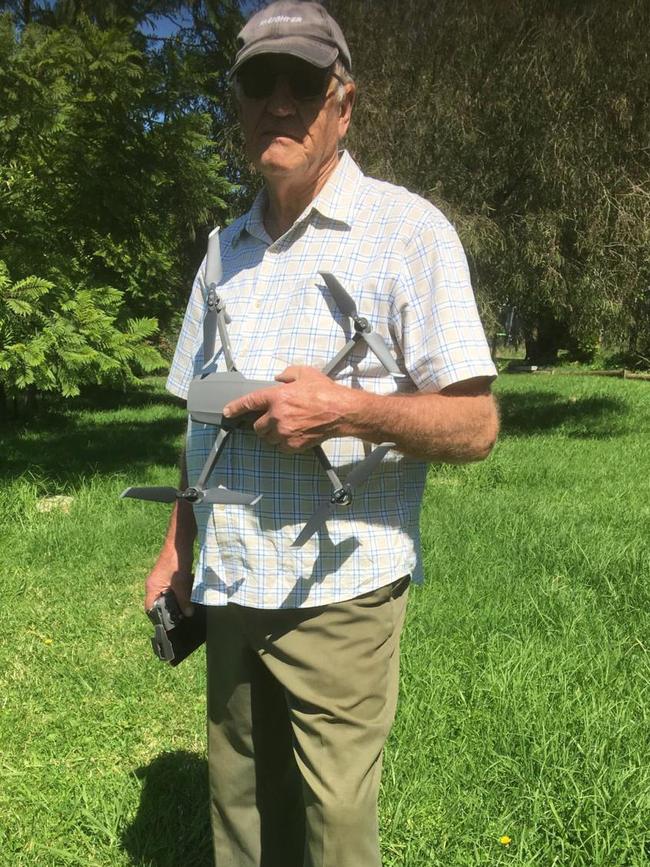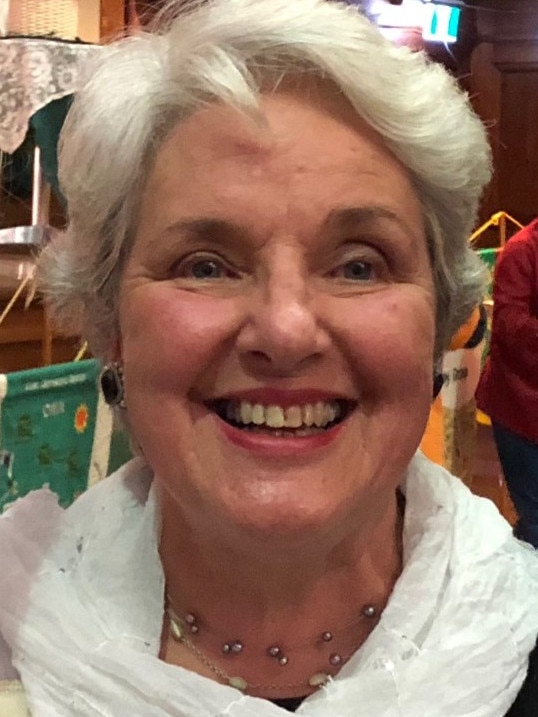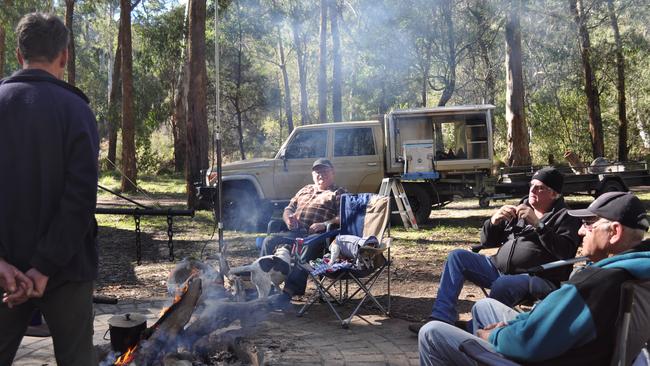4WD key as police close in on high country suspect
This rugged 4WD is owned by thousands of Aussies, including hundreds of high country hunters — and it’s helping police close in on a suspect in the case of the missing campers.
A year after the disappearance of two campers at Wonnangatta in the high country, police are quietly closing in on someone they think has a ghastly secret in his head and a rugged 4WD in his driveway.
The vehicle is the type that thousands of Australians own, including hundreds of deer hunters who shoot in the high country.
But even if the owner has got rid of it recently, that might only strengthen the case against him.
Investigators now believe that such a person, maybe with an associate, was the last to see Russell Hill and Carol Clay alive near their campsite one year ago, the week the COVID pandemic hit Australia.
Unless the as-yet unidentified 4WD driver is cleared by a watertight alibi or by forensic science, he is the key suspect for the couple’s deaths.
The one thing police have become more certain of is that the two outdoors lovers met foul play.
The timing of the suspected double homicide helped the perpetrator because of the COVID outbreak — a massive distraction which dominated media coverage and choked public collaboration and proper investigation for many days.

But if the presumed killer felt lucky in the first week or two, when it seemed possible the missing pair were lost or had secretly run away, his luck is running out now. Justice is catching up.
Months of patient detective work has narrowed the field to those who were in the mountains around March 21 but have not come forward.
In other words, some people have drawn attention to themselves by trying not to draw attention to themselves.
That sort of evasiveness is not proof of murder but it makes them persons of interest to investigators, who are tightening the screws.
There are two strands to the investigation.
One is that a 4WD seen in the Wonnangatta area in late March remains unaccounted for and is seen as a key to the fate of Russell Hill and Carol Clay.
The other clue is mobile telephone use. Sophisticated ways of analysing calls across the entire area at the crucial time pinpoints people who were present but have not come forward.
Police now routinely use versions of the methods used to eliminate or isolate suspects in murders such as the Ristevski case in 2016 and Jill Meagher in 2012.
International anti-terrorism efforts have improved the way experts interpret mobile phone data, which is why the Wonnangatta investigators sought overseas help late last year.
When the investigators reel in potential suspects, they will ask them what they were doing in the Wonnangatta valley on certain days last March.
A flat denial would be a provable lie. An admission would cue the next question: Why not identify yourself like other hunters and campers have?
After that, the questions would be leading towards the big one: “Where are the bodies?”


For the investigators, it is a long chess game that started late and slowly through no fault of anyone involved. Because the Wonnangatta mystery broke just as the pandemic hit, the national emergency overshadowed it.
By the time a passing camper reported Russell Hill’s burnt-out tent and scorched Toyota to police at Sale, several days had passed. Initial media reports did not make the time lapse clear, confusing potential witnesses.
At first, it seemed reasonable to think the pair had got lost and that their tent had coincidentally burned, perhaps from an untended campfire — or arson by opportunist sneak thieves who had pilfered the camp after spying the empty tent and locked car.
The fact that Russell Hill’s expensive drone was missing raised the possibility that the pair went looking for it in the bush off the usual tracks, became lost then died from exposure, their bodies soon eaten by wild dogs. That grim scenario has played out many times in the mountains over the decades.
Police camping at the site found big dog prints outside their own tent one morning, underlining the ever-present danger to anyone lost, ill or injured and unarmed.
But two aspects hardened the investigators’ suspicion of foul play.
One was that organised searchers could find no trace of the missing couple inside a large search zone. Secondly, some speculated that the couple’s sleeping bags were missing from the tent — an assumption apparently based on the idea that no zips were found.
If this is true, and there’s no firm evidence it is, it implies that sleeping bags could have been used to hide bodies in a vehicle.
It is not a theory a prosecutor would rely on in a murder trial because modern sleeping bags mostly have plastic zips that melt, meaning the “missing” sleeping bags might well have burned to unidentifiable ash.
Painstaking detectives will have tried to ascertain which types of sleeping bags the couple used.
Meanwhile, some conclusions drawn in the first months still apply.
It was soon clear, despite speculation, that the pair did not stage their disappearance, something hugely difficult to do because of computerised banking, credit cards and universal security and traffic cameras.

Mr Hill, an experienced bushman and camper, had worked in the area as a logging contractor in the past.
Given he and Ms Clay were in their 70s, it seems unlikely they would walk into rough country far from camp. That is, of course, unless they had a reason — such as looking for his $2000 drone.
Then there is the macabre longshot possibility that it was an elaborate murder-suicide by a secretive man leading a double life.
Time makes mysteries deeper.
That’s why the couple’s disappearance has become one of the most talked-about cases since the notorious Wonnangatta murders in the same area a century earlier.
The fact that three other people have disappeared inside a 60km radius in the previous nine years has bred persistent rumours about an eccentric spear-hunting bushman known locally as “Button Man”.
Police have played down their initial interest in the oddball who was reportedly the last to see bushwalker Niels Becker before he vanished near Mt Stirling in October 2019.
It is now 360 days since Mr Hill picked up Carol Clay from near her Pakenham home on the morning of March 19.
To a casual observer, it was nothing odd. Just a fit-looking 70-something man in a white Toyota Landcruiser, rigged out for camping, with a pleasant woman his own age.
They looked like grey nomads off on a trip. They were, except for one thing: no-one else in either family knew that they were going camping together.
Russell Hill and his wife were long-time friends of Ms Clay, a well-known figure in the Country Women’s Association.
The Hills lived in Drouin after returning there from Heyfield, where they had been in the 1980s while Mr Hill worked in the bush, logging for local sawmills.
While working, he would go through Licola to reach timber coupes towards the old Wonnangatta Station, well-known in East Gippsland because two men were murdered there around the Christmas of 1917.
On March 19, Mr Hill apparently took his usual route through Heyfield and Licola to Wonnangatta, which is popular with 4WD and dirt bike enthusiasts, trail riders, bush walkers and hunters.
The pair vanished during the 18 hours after Mr Hill made a radio call to a friend late on March 20.
He said then he was about to set up camp near the old station site.
Sometime that night or next morning, the pair disappeared. By the time a passing traveller saw their camp around 2pm next afternoon, March 21, the tent had burned down, scorching the Toyota. The ashes were cold.
The alarm wasn’t raised for some days, so the trail was cold, too.
When Sale police arrived, they found the Toyota locked. It seems Mr Hill was probably carrying his keys and his mobile phone, as they have never been found.
No assumption is completely safe, but some scenarios might be more likely than others.
Someone who has lived in the country all his life is unlikely to have locked his car while sitting next to it.
But he would probably lock it if they both went for a walk, because casual pilfering can happen in remote spots that attract all sorts of people, including armed marijuana “crop minders” posing as hunters.
The tent fire could be arson or a coincidence. There is no evidence an accelerant was used, but a plastic tent would burn fiercely anyway. Thieves often set fires, whether maliciously or to destroy fingerprints and DNA.
Over time, the police view hardened against the idea the pair were lost.
Still, it’s highly likely that Mr Hill would light a campfire first thing in the morning. And plausible that after breakfast, he would take his expensive DJI Movic drone and take a walk with Ms Clay. There’s not much else to do.
It is natural that anyone who spends $2000 on a drone is going to use it — and therefore run the risk of losing it, then of losing themselves looking for it.
Drones are easily lost or damaged if flown among trees, and eagles and hawks often attack them on sight.
An alternative theory to explain the drone’s absence is that Mr Hill left it in the tent and that a passing opportunist stole it before torching the camp.
Whether such a thief would also commit murder is the big question.
But police believe that someone probably did.
Whoever is in their crosshairs would be wise to come forward before the sledgehammers come through the door.
If there is an arrest but no confession and no bodies, it will be the highest-profile case in Gippsland since the disappearance of toddler Jaidyn Leskie from Moe in 1998.
Keen defence lawyers should start making a long list of walkers lost in the mountains and never found.
More Coverage
Originally published as 4WD key as police close in on high country suspect



